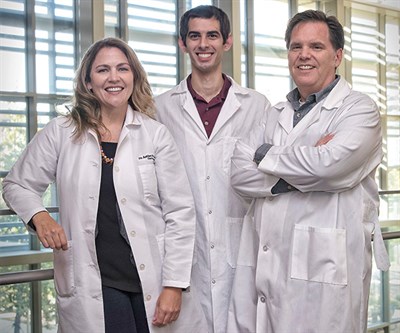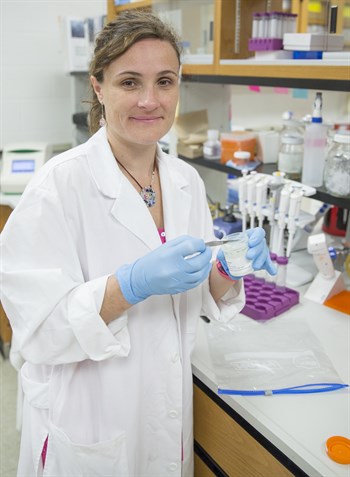Texas A&M Seeks Healthy Dogs for Second Phase of ‘Aging Project’ Trial
Veterinarians from the Texas A&M College of Veterinary Medicine & Biomedical Sciences (CVM) are seeking middle-aged, healthy dogs of any breed, or combination of breeds, to participate in a clinical trial as part of the Dog Aging Project’s second phase. The growing focus of the aging research at Texas A&M—led by Dr. Kate Creevy, an […]
Engineering New Possibilities
For decades, biomedical engineers have used their acumen to revolutionize healthcare through the development of devices, tools, equipment, techniques, and pharmaceuticals that have advanced the medical field in ways previously unimaginable. While patients around the world have benefited from this ingenuity, those patients almost exclusively have had one thing in common—they’ve all been human. Researchers […]
Texas A&M Graduate Student Earns NIEHS Superfund Externship Award
Krisa Camargo, a graduate research assistant in the Texas A&M College of Veterinary Medicine & Biomedical Sciences’ (CVM) Veterinary Integrative Biosciences department and a pre-doctoral trainee with the Texas A&M University Superfund Research Center, has been recognized with a 2018 KC Donnelly Externship Award. Granted by the National Institute of Environmental Health Sciences’ Superfund Research […]
Texas A&M, Cornell Collaborate to Advance Education Research, Expand Pipeline for Underrepresented Students
Texas A&M and Cornell universities have joined forces to advance research on antimicrobial resistance (AMR) in veterinary medical education and to expand the pipeline for underrepresented students in the field. Funded by a $300,000 federal grant from the United States Department of Agriculture’s (USDA) National Institute of Food and Agriculture (NIFA), researchers from both universities […]
Texas A&M Study Links Breast Cancer, Body’s Internal Clock
For years, doctors have associated the BRCA1 and BRCA2 gene mutations with an increased risk of breast cancer. But researchers at Texas A&M University have now identified another gene that may have an impact on breast cancer—associated with the body’s circadian rhythm. Texas A&M College of Veterinary Medicine & Biomedical Sciences (CVM) professor Weston Porter […]
Texas A&M Study Offers New Virus-Host Protein Insight, New Possibilities for Antiviral Development
Viruses have a very limited set of genes and, therefore, must use the cellular machineries of their hosts for most parts of their growth. In a new study, scientists at Texas A&M and Uppsala universities have discovered a specific host protein that many viruses use for their transport within the cell. The human gene, ZC3H11A, […]
A&M Research Receives FDA Orphan-Drug Designation for Angelman Syndrome Treatment
College Station, Texas — The U.S. Food and Drug Administration has granted orphan-drug designation to GTX-101 for the treatment of Angelman syndrome, a rare neurogenetic disorder that affects approximately 1 in 15,000 people. GTX-101 is the first drug candidate for startup GeneTx Biotherapeutics, LLC (GeneTx). “No approved treatments for Angelman syndrome exist today,” said Allyson […]
Angelman Syndrome Treatment Being Investigated
Research from the laboratory of Texas A&M College of Veterinary Medicine & Biomedical Sciences (CVM) associate professor Scott Dindot has become the basis for an investigational antisense drug that researchers hope will lead to the treatment of Angelman syndrome (AS). Investigational-new-drug-enabling studies on the potential therapeutic are currently underway with GeneTx Biotherapeutics LLC (GeneTx), a […]
Muscular Dystrophy Research
DMD is a devastating disease that affects both children and dogs. It is a genetic disease that affects boys, all of whom die early in life, living only into their twenties, but only after much suffering. Any parent with an affected child is acutely aware of how devastating this disease is, not only to the […]
CVM Researchers Develop Diagnostic Test for 11 Tick-Borne Diseases
The warmer weather can mean many things for pet owners in Texas. Chief among those should be ticks. The domestic Brown Dog, Lone Star, Gulf Coast, and other ticks are the cause of the thousands of tick-borne disease cases reported annually in the United States. Thanks to a diagnostic test created by researchers in the […]











